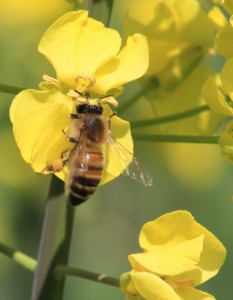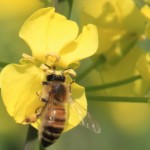Pollinator Health
Canola Loves Bees
- Bees are essential for hybrid canola seed production. That’s because they deliver pollen from male parent lines to female parent plants, increasing germination of resulting seeds from 83 to 96 percent.
- Bee pollination encourages higher canola yields with better ripening. Demonstrated benefits include:

- More uniform flowering and earlier pod-setting
- Increasing the number of pods per plant, seeds per pod and seed weight
- Reducing canola bloom time by 17%
- Increasing seed weight per plant from 13% to nearly 50%
- Bees may help to control canola diseases. Researchers are exploring the potential for honeybees to spread beneficial fungi for controlling insects like Lygus bugs.
Bees Love Canola
- Canola is an ideal habitat and food source for honeybees. That’s because:
- Canola flowers produce high amounts of nectar, which has a good sugar profile for honey production, and its plentiful pollen offers a good nutritional balance of amino acids, protein and fats.
- Bountiful canola flowers allow bees to feed efficiently within reasonable distances. Canola fields bloom for relatively long periods, providing bees with a good source of nectar for up to a month.
- Canola honey is preferred by consumers due to its light color and mild flavor (two reasons why people also love canola oil).
Source: Canola Council of Canada
Honey Bee Health Coalition
The U.S. Canola Association is a member of this coalition, joining more than 30 organizations from across the food, agriculture, government and conservation sectors, to help reverse declines in honey bee health and ensure the long-term health of pollinators. Among several initiatives, Best Management Practices for Pollinator Protection in Canola Fields were developed with grower and beekeeper communication tools. Learn more in the video and documents below as well as at HoneyBeeHealthCoalition.org.
What's New
Neonicotinoid Product Applicator Tips
Neonicotinoid Product Grower Tips
Bee Culture on Best Management Practices to Protect Pollinators
